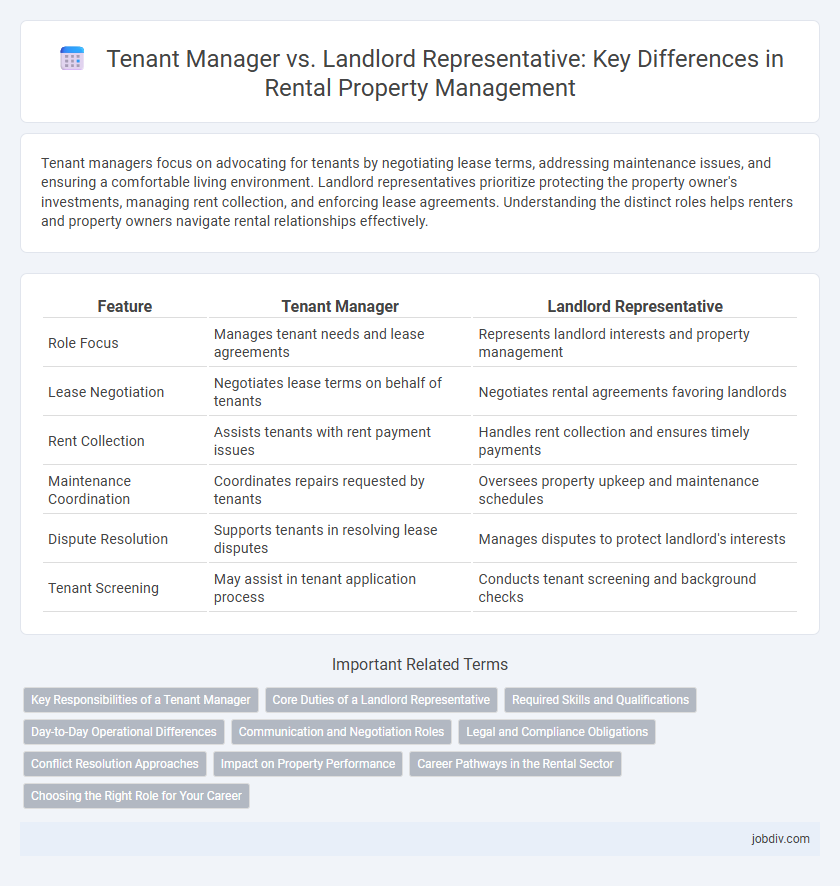Tenant managers focus on advocating for tenants by negotiating lease terms, addressing maintenance issues, and ensuring a comfortable living environment. Landlord representatives prioritize protecting the property owner's investments, managing rent collection, and enforcing lease agreements. Understanding the distinct roles helps renters and property owners navigate rental relationships effectively.
Table of Comparison
| Feature | Tenant Manager | Landlord Representative |
|---|---|---|
| Role Focus | Manages tenant needs and lease agreements | Represents landlord interests and property management |
| Lease Negotiation | Negotiates lease terms on behalf of tenants | Negotiates rental agreements favoring landlords |
| Rent Collection | Assists tenants with rent payment issues | Handles rent collection and ensures timely payments |
| Maintenance Coordination | Coordinates repairs requested by tenants | Oversees property upkeep and maintenance schedules |
| Dispute Resolution | Supports tenants in resolving lease disputes | Manages disputes to protect landlord's interests |
| Tenant Screening | May assist in tenant application process | Conducts tenant screening and background checks |
Key Responsibilities of a Tenant Manager
A Tenant Manager primarily focuses on overseeing tenant relations, ensuring lease compliance, and addressing maintenance requests promptly to enhance tenant satisfaction and retention. They coordinate tenant move-ins and move-outs, manage rent collection issues, and serve as the main point of contact for tenant concerns. Unlike a Landlord Representative, whose responsibilities are more aligned with property ownership interests and financial management, a Tenant Manager is dedicated to tenant advocacy and operational support.
Core Duties of a Landlord Representative
A Landlord Representative primarily handles property leasing, rent collection, and maintaining tenant relationships to ensure consistent occupancy and revenue flow. They coordinate maintenance and repairs, enforce lease terms, and advocate for the landlord's interests in negotiations and disputes. Unlike Tenant Managers, whose focus is tenant satisfaction and lease compliance, Landlord Representatives concentrate on maximizing property value and landlord profitability.
Required Skills and Qualifications
Tenant Managers require strong negotiation skills, expertise in lease agreements, and proficiency in property management software to effectively oversee tenant relations and ensure compliance with rental terms. Landlord Representatives must possess a thorough understanding of landlord-tenant laws, excellent communication abilities, and experience in marketing rental properties to attract and retain tenants. Both roles demand organizational skills, attention to detail, and conflict resolution capabilities to maintain successful rental operations.
Day-to-Day Operational Differences
Tenant Manager handles daily communication with tenants, addressing maintenance requests, rent collection, and ensuring lease compliance to enhance tenant satisfaction. Landlord Representative focuses on property owner interests by overseeing financial reporting, lease negotiations, and risk management to maximize property value. Operationally, Tenant Manager engages directly with tenants, while Landlord Representative liaises primarily with property owners and external vendors.
Communication and Negotiation Roles
Tenant managers act as the communication bridge between tenants and landlords, ensuring tenant concerns and requests are clearly conveyed and addressed. Landlord representatives negotiate lease terms, rent adjustments, and maintenance responsibilities to protect the property owner's interests. Both roles require strong negotiation skills, but tenant managers prioritize tenant satisfaction while landlord representatives focus on maximizing property value and legal compliance.
Legal and Compliance Obligations
Tenant Managers ensure tenants comply with lease terms, local housing laws, and safety regulations, preventing legal disputes through proactive oversight. Landlord Representatives handle landlords' legal responsibilities, including property maintenance standards, rent control compliance, and eviction processes under applicable tenancy laws. Both roles require in-depth knowledge of rental statutes to uphold contractual integrity and mitigate liability risks effectively.
Conflict Resolution Approaches
Tenant managers prioritize direct communication and mediation to address conflicts, emphasizing tenant satisfaction and quick resolution to maintain occupancy. Landlord representatives focus on enforcing lease agreements and legal frameworks, aiming to protect property interests while minimizing liability risks. Both approaches utilize negotiation skills, but tenant managers often adopt a more empathetic stance, whereas landlord representatives emphasize contractual compliance.
Impact on Property Performance
Tenant managers directly enhance property performance by ensuring tenant satisfaction, timely rent collection, and proactive maintenance reporting, which reduces vacancies and boosts cash flow. Landlord representatives focus on optimizing lease terms and managing property investments, driving long-term asset value and strategic growth. Both roles impact property performance differently: tenant managers improve day-to-day operational efficiency, while landlord representatives influence financial outcomes and portfolio management.
Career Pathways in the Rental Sector
Tenant Managers typically progress through roles specializing in client relations and property management, gaining expertise in lease negotiations and tenant retention strategies. Landlord Representatives often advance by developing skills in property acquisition, legal compliance, and portfolio management, positioning themselves as key advisors in rental market trends. Both career pathways offer opportunities for specialization in sectors such as commercial or residential rentals, with potential growth into senior management or consultancy roles within real estate firms.
Choosing the Right Role for Your Career
Tenant Managers specialize in advocating for renters by negotiating leases, managing tenant relations, and ensuring property standards meet occupant needs. Landlord Representatives focus on maximizing property value through marketing, lease agreements, and tenant screening to protect owner interests. Selecting the right role depends on your skills in negotiation, property management, and whether you prefer representing tenant rights or landlord objectives in the rental market.
Tenant Manager vs Landlord Representative Infographic

 jobdiv.com
jobdiv.com